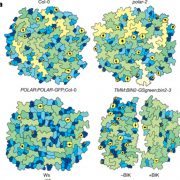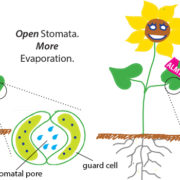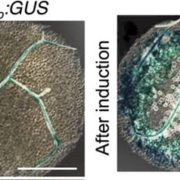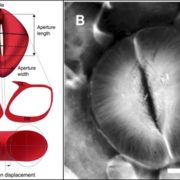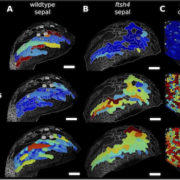New insights in cell death in plants might generate new leads for weed control
The lab of Prof. Moritz Nowack (VIB-UGent Center for Plant Systems Biology) investigates the regulation of these plant cell death processes in the model plant Arabidopsis.
Dr. Huysmans, first author of this study: “To study plant cell death, we are using the plant’s root cap as a model system. The root cap is situated at the tip of the growing root, guiding and protecting the delicate root tip as it pushes through the soil. Individual root cap cells are constantly regenerated and have a short life span that ends in programmed cell death.”
In this project, the researchers aimed at discovering new genes that control the cell death process in plants. To this end, they studied transcription factors, which regulate gene expression as the starting point of protein production. The regulated production of proteins is an important first step to ensure the orderly execution of cell death.
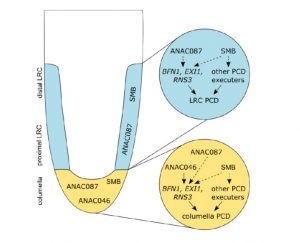 Huysmans: “To identify regulators of cell death, we compared which transcription factors are produced both in wood cells and in root cap cells. As both cell types undergo programmed cell death, we hoped to identify important regulators of this process. We found a number of common transcription factors and analyzed two of them, ANAC087 and ANAC046, in detail.”
Huysmans: “To identify regulators of cell death, we compared which transcription factors are produced both in wood cells and in root cap cells. As both cell types undergo programmed cell death, we hoped to identify important regulators of this process. We found a number of common transcription factors and analyzed two of them, ANAC087 and ANAC046, in detail.”
In mutants that abnormally produced these factors outside the root cap, the team of Nowack found that many cells died within 24 hours, leading to growth arrest and seedling death. Conversely, when analyzing mutants that were unable to produce ANAC087 and ANAC046, they found that root cap cells lived much longer than in regular Arabidopsis plants.
Moritz Nowack (VIB-UGent Center for Plant Systems Biology): “These results show that both transcription factors are important regulators of programmed cell death in Arabidopsis. Surprisingly, our results also revealed that root cap cells that are detached from the roots and reside in the rhizosphere have a genetically determined life span.”
Identifying transcription factors controlling the cell death program is but a first step. To find the proteins that do the actual killing job, target genes controlled by ANAC087 and ANAC046 need to be analyzed.
Moritz Nowack: “Ultimately, we strive to understand the complex network of proteins that is necessary to execute cell death in plants. This knowledge might generate new leads on how to control cell death in weeds and crop plants. Inducing naturally occurring cell death in weeds would be an environment-friendly way for weed control, while optimizing cell death processes in crop plants could contribute to stabilization of plant yield under adverse environmental conditions.”
Publication
| VIB-UGent Center for Plant Systems Biology The VIB-UGent Center for Plant Systems Biology wants to gain insight into how plants grow and respond to the environment. Scientists study how leaves and roots are formed, which micro-organisms live on and around the plant and which substances the plant makes. They map out the genetic diversity of the plant kingdom. This knowledge can lead to sustainable innovations in agriculture and food.
VIB
|
Ghent University
After more than twenty years of uninterrupted growth, Ghent University is now one of the most important institutions of higher education and research in the Low Countries. Ghent University yearly attracts over 41,000 students, with a foreign student population of over 2,200 EU and non-EU citizens. Ghent University offers a broad range of study programs in all academic and scientific fields. With a view to cooperation in research and community service, numerous research groups, centers and institutes have been founded over the years. For more information www.UGent.be.
More news from:
. University of Ghent
. VIB (Flanders Interuniversity Institute for Biotechnology)
Website: http://www.ugent.be
Published: August 14, 2018


